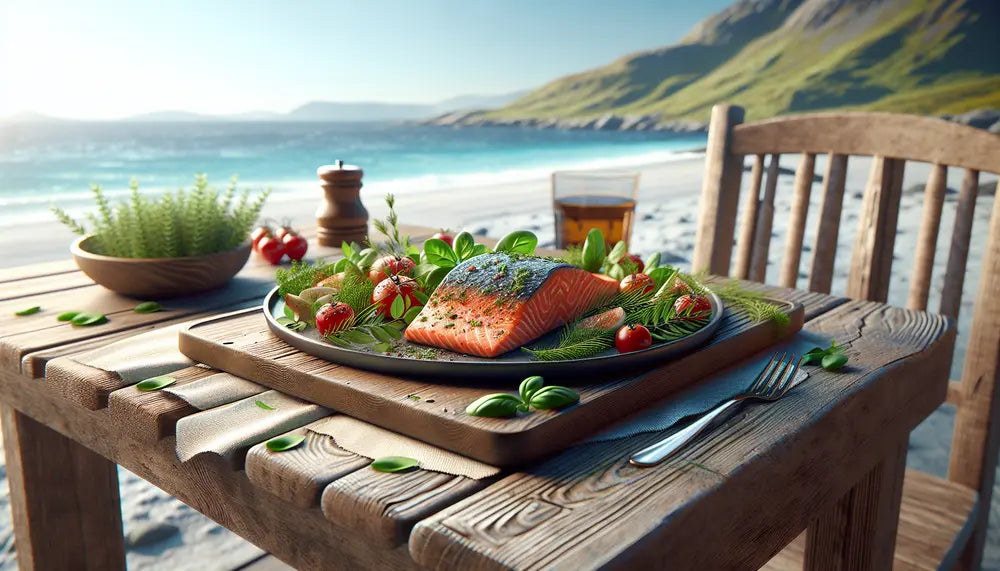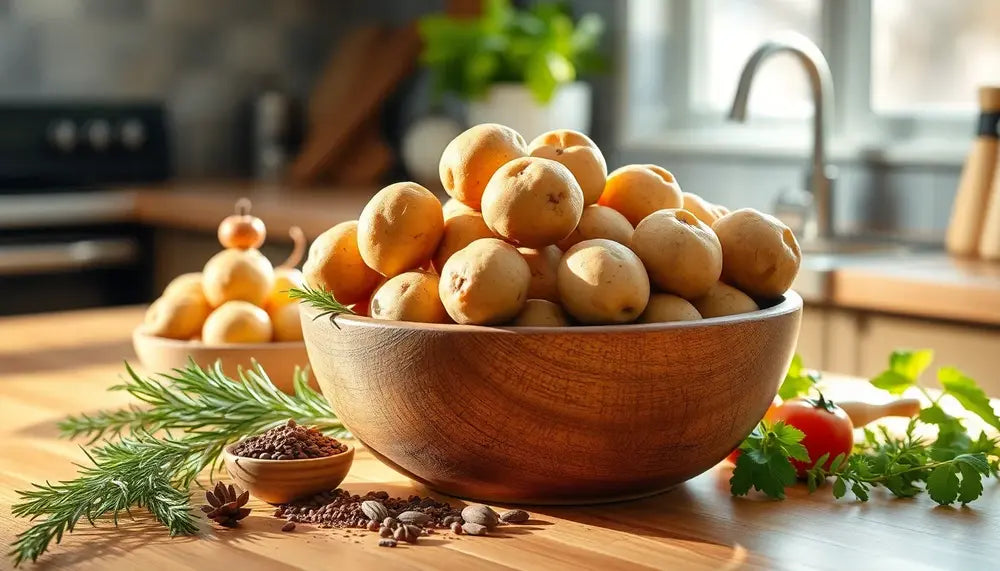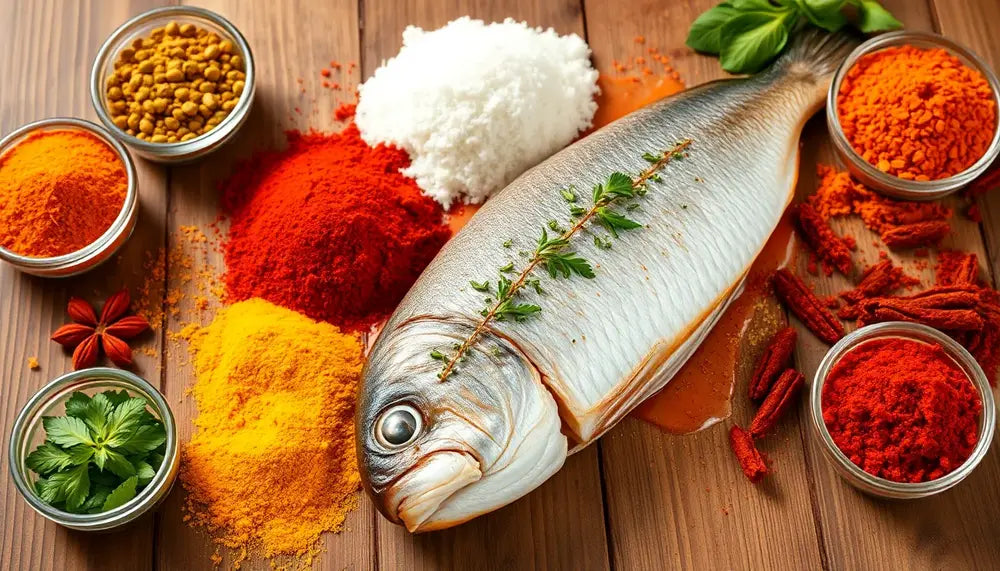Choosing the right ingredients for your salmon marinade
The foundation of every excellent Marinade for salmon begins with the careful selection of ingredients. For optimal results, fresh and high-quality components should be used. A must in every marinade are acidic ingredients such as lemon juice or vinegar, which make the fish tender and juicy. Oil is also essential as it helps absorb the flavors of the spices and keeps the salmon moist while cooking.
Spices and herbs play a critical role in flavor development. Dill, parsley and cilantro offer fresh, bold flavors, while garlic and onions add a savory depth. Honey or maple syrup can be incorporated for a sweet note. It's important to find the balance between flavors to enhance and not overpower the natural flavor of the salmon.
Feel free to experiment with different spice compositions to create your personal favorite marinade. Remember that the quality of the ingredients makes the difference between a good marinade and an exceptional one.
How to prepare a marinade for salmon
The preparation of one Marinade for salmon is a simple process that can significantly enrich your dining experience. Start by combining your chosen liquid ingredients -- such as olive oil and lemon juice -- in a medium bowl. This will form the base of your marinade.
Add your chosen spices and herbs. An effective way to enhance the flavors is to grind the herbs and spices in a mortar before adding them to the marinade. This releases the essential oils and intensifies the flavor.
After all ingredients are added, stir the mixture thoroughly until all components are well mixed. Place the salmon in the bowl or in a resealable plastic bag and pour the marinade over it. Make sure the fish is completely covered with the marinade. To ensure even distribution, you can carefully turn the fish in the marinade.
Let the salmon marinate for at least 30 minutes, but preferably longer for a more intense flavor. The longer the salmon is marinated, the more flavor it absorbs, but the marinating time should not exceed four hours to preserve the texture of the fish.
Advantages and disadvantages of salmon with a special marinade
| Advantages | Disadvantages |
|---|---|
| Rich in omega-3 fatty acids | Can be expensive to purchase |
| Improving the taste through the marinade | Marinades can contain hidden allergens |
| Conducive to a healthy diet | Excessive consumption can lead to heavy metal contamination |
| Can be served as a versatile dish | Marinade can mask the natural flavor of the salmon |
| May support heart health | Not suitable for people with seafood allergies |
Optimal exposure time for a flavor-intensive marinade
The optimal exposure time for a marinade can significantly influence the taste and quality of the salmon. For fish, especially salmon, a marinade time that is too long is often not beneficial because the acidity of the marinade can break down the proteins in the fish and affect its texture.
The ideal time to marinate salmon is usually between 30 minutes and 2 hours. This amount of time allows the marinade's flavors to permeate the fish without affecting its texture too much. This is especially true if the marinade contains acidic components such as lemon juice or vinegar.
For those who prefer a less intense flavor absorption or if the marinade is particularly acidic, a shorter exposure time of about 15 minutes be sufficient. It is important to keep the salmon refrigerated during the marinating process to ensure the freshness and safety of the fish.
Ultimately, the optimal marinating time also depends on your personal taste. Experiment with different times to find what duration works best for your specific marinade and taste.
Different types of marinades for salmon
There are a variety of Marinades for salmon, each of which can produce different flavor profiles. Depending on the ingredients and method of preparation, you can find something to suit every taste.
- Asian marinade: This typically uses ginger, soy sauce, sesame oil and garlic. Additives such as honey or brown sugar add a sweet note that harmonizes well with the savory taste of soy sauce.
- Mediterranean marinade: Olive oil, lemon juice, fresh herbs such as rosemary, oregano or thyme and often garlic are typical. This marinade emphasizes the freshness and lightness of the salmon.
- Scandinavian dill marinade: These simple but flavorful marinades are based on dill, lemon juice, white pepper and olive oil. They are particularly popular for the traditional Gravad Lax dish.
- Spicy Cajun Marinade: For lovers of intense, spicy flavors, a mixture of Cajun spices, garlic powder, onion powder, thyme and sometimes a little citrus to taste is ideal.
Each marinade gives the salmon a unique touch and can be chosen depending on your preference and occasion. It's worth experimenting with different ingredients and combinations to discover your personal favorite marinade.
Tips for cooking marinated salmon perfectly
The cooking of marinated salmon requires care to maintain both flavor and texture at its best. Here are some tips to help you achieve perfect results:
- Correct cooking time: Salmon should not be overcooked to avoid drying out. Normally a cooking time of 8-10 minutes at an oven temperature of 160°C (fan oven) is sufficient, depending on the thickness of the piece of fish.
- Using parchment paper or foil: To retain moisture and promote even cooking, you can wrap the salmon in parchment paper or aluminum foil. This creates a type of steamer that locks in the flavors.
- Preheat the oven: Make sure the oven is fully heated before adding the salmon. A constant temperature is crucial for even cooking.
- Pay attention to the internal temperature: The ideal core temperature for perfectly cooked salmon is around 50°C. A kitchen thermometer can be very useful to pinpoint this point.
These tips will help you with your marinated salmon both tasty and juicy to prepare and get the most out of your marinades. Enjoy the delicate, aromatic result.
Serving suggestions for marinated salmon
Marinated salmon is a versatile dish that can be served in a variety of ways. Here are some Serving suggestionsthat make your meal special:
- As a main course: Serve the marinated salmon with a side of fresh steamed vegetables and a light salad. A side dish of quinoa or wild rice ideally complements the meal.
- In a salad: Crumble the cooked salmon and toss it over a leafy green salad with avocado, cherry tomatoes, and a light lemon-dill vinaigrette.
- As a starter: Make small bites by placing pieces of marinated salmon on crackers or blinis with a dollop of crème fraîche and a sprig of dill.
- In a pasta: Combine the salmon with fettuccine, fresh spinach and a cream sauce to create a rich and satisfying meal.
These suggestions will ensure that your marinated salmon becomes the star of every meal and is sure to impress your guests with its versatility and delicate flavors.
Common mistakes when marinating salmon and how to avoid them
When marinating salmon, it's easy to make mistakes that affect the end result. Here are some of the most common mistakes and tips on how to avoid them:
- Using too much acid: An excessive amount of acidic ingredients, such as lemon juice or vinegar, can quickly make the salmon's texture tough. Limit the amount of acid in your marinade or shorten the marinating time.
- Excessive marinating time: Salmon should not be marinated for too long as this can soften the fish and cause an unpleasant mouthfeel. To prevent this, keep the marinating time between 30 minutes and a maximum of 2 hours.
- Incorrect storage temperature: Marinating should always be done in the refrigerator to preserve the freshness of the fish and prevent the growth of bacteria. Avoid letting marinated salmon sit at room temperature.
- Do not cover: Don't forget to cover the salmon while marinating to seal in the flavors and ensure even distribution of the marinade.
By following these tips, you can avoid the most common mistakes when marinating salmon and Make sure your fish is cooked optimally will.
Health Benefits of Marinated Salmon
Marinated salmon is not only a delicious choice for meals but also offers numerous health benefits. This fish is known for its high content of omega-3 fatty acids, which are essential for heart health and have anti-inflammatory properties.
- Rich in Omega-3 fatty acids: Omega-3 helps lower blood pressure and supports blood vessel health. Regular intake of salmon can reduce the risk of diseases such as heart attack and stroke.
- High protein content: Salmon is an excellent source of protein, which is important for building and repairing body tissue, as well as maintaining good muscle mass.
- Source of vitamin D: Especially during the winter months, eating salmon can help prevent vitamin D deficiency, which is essential for strong bones and a healthy immune system.
- Low heavy metal contamination: Compared to many other ocean fish, salmon typically has lower concentrations of heavy metals like mercury, making it a safer choice in your diet.
So, incorporating marinated salmon into your diet can not only please your taste buds but also various health benefits offer.
How to incorporate marinated salmon into your diet
The integration of marinated salmon into your diet is an excellent way to reap its health benefits and add variety to your meals. Here are some simple ideas to enjoy marinated salmon regularly:
- Weekly menu planning: Incorporate marinated salmon as a regular part of your weekly menu. For example, you may decide to enjoy salmon every Wednesday evening. This helps establish a routine and ensures a balanced diet.
- Various types of preparation: Vary the method of preparation to make meals exciting. In addition to classic baking, you can also grill, steam or even use marinated salmon in a stir-fry.
- Snack option: Smaller portions of marinated salmon make a great nutritious snack between meals. Pair it with a small salad or on a whole wheat bun for a quick, healthy snack.
- As part of diet programs: Incorporating marinated salmon into diet programs can be an effective way to get healthy fats and proteins without having a high calorie intake. Check how much salmon is recommended in your specific diet.
These methods make it easy and varied to incorporate marinated salmon fillet into your daily diet, which not only contributes to your health but also enriches your culinary experience.
FAQ: Delicious salmon dishes with a sophisticated marinade
What are the basic ingredients for a marinade for salmon?
A basic marinade for salmon typically includes olive oil or another high-quality oil, acid such as lemon juice or vinegar, and flavorings such as herbs and spices. Dill, parsley and garlic are particularly popular.
How long should salmon be marinated?
Ideally, salmon should be marinated for 30 minutes to a maximum of 2 hours to achieve the best flavor without compromising the texture.
Can I prepare marinade wild salmon in the oven?
Yes, you can prepare wild salmon marinade in the oven. Cook the marinated salmon at 160 degrees for about 8-10 minutes to obtain a juicy and tender consistency.
Which spices go particularly well with a salmon marinade?
Depending on the desired flavor, different spices can be used. Dill, pepper, garlic and lemon zest are classic options. Also experiment with more exotic spices like coriander or turmeric to create unique variations.
What other preparation methods are there for wild salmon marinade?
In addition to preparing it in the oven, you can also grill, steam or poach marinade wild salmon. Each method offers a different texture and can bring out the flavors of the marinade differently.





Share:
Grilled meat to die for: The best marinades for real grill fans
Quick and tasty: neck steak with a sophisticated marinade